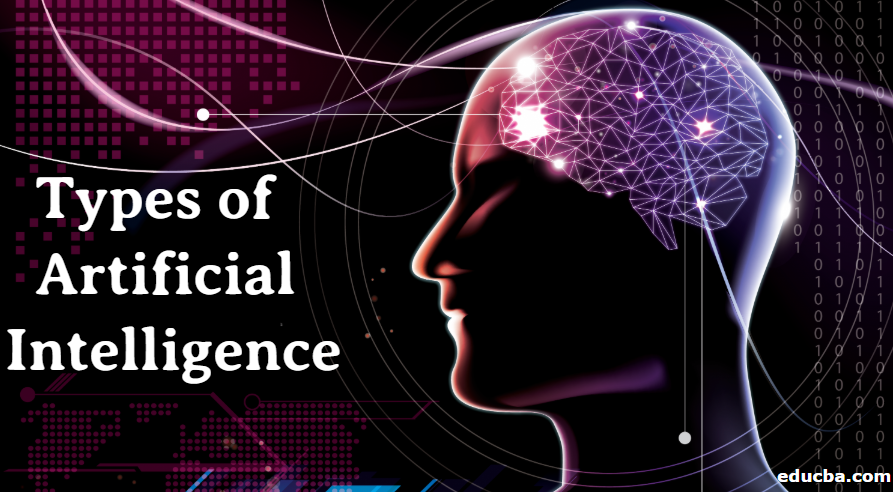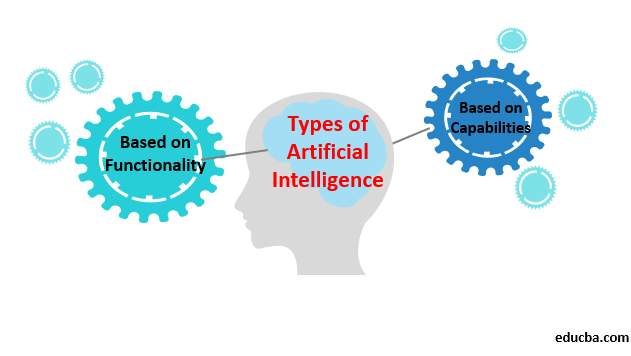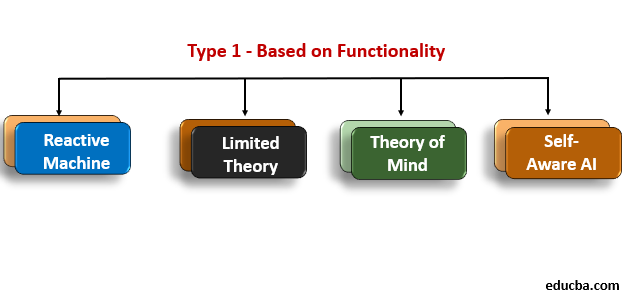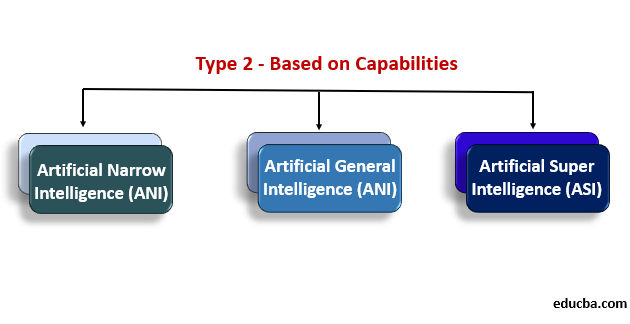Updated May 23, 2023

Introduction to Types of Artificial Intelligence
The following article provides an outline for the most important type of Artificial Intelligence. The main aim of Artificial Intelligence aim is to enable machines to perform a human-like function. Thus, the primary classification of AI is based on how well it can replicate human-like actions. AI can, by and large, be classified based on two types, both based on its ability to replicate the human brain. One type of classification, “Based on Functionality,” classifies AI based on its likeness to the human mind and its ability to think and feel like humans. The second way of classification is more prominent in the tech industry, which is” Based on Capabilities” of AI vis-à-vis Human Intelligence.
Different Types of Artificial Intelligence
There are mainly two types of AI which are based on Functionality & Capabilities:

Type 1 – Based on Functionality

1. Reactive Machine
They are the most basic and oldest type of Artificial Intelligence. They replicate a human’s ability to react to different kinds of stimuli. This type of AI has no memory power, so it cannot use previously gained information/experience to obtain better results. Therefore, these kinds of AI can’t train themselves like the ones we come across nowadays.
Example: Deep Blue, IBM’s chess-playing supercomputer, is the perfect example of these kinds of machines. It is famous for defeating international grandmaster Garry Kasparov in the late 1990s. Deep Blue can identify different pieces in the chessboard and how each moves. It can identify all the possible legal moves for itself and its opponents. Based on the option, it selects the best possible move. However, it can’t learn from its past moves as these machines don’t have any memory.
2. Limited Theory
This type of AI, along with the ability of Reactive Machines, has memory capabilities so they can use past information/experience to make better future decisions. Most of the common applications existing around us fall under this category. These AI applications can be trained by a large volume of training data stored in their memory in a reference model.
Example: Limited Memory technology is used in many self-driving cars use. They store data like GPS location, speed of nearby cars, size /nature of obstructions, and a hundred other data to drive as a human does.
3. Theory of Mind
Theory of Mind is the next level of AI, which has limited to no presence in our daily lives. These kinds of AI are mostly in the “Work in Progress” stage and are usually confined to research labs. These kinds of AI, once developed, will have a very deep understating of human minds ranging from their needs, likes, emotions, thought process, etc. Basis their understanding of Human minds and their whims, the AI will be able to alter its response.
Example: Researcher Winston, in his research, showed a prototype of a robot that can walk down a small corridor with other robots coming from the opposite direction; the AI can foresee other robot’s movements and can turn right, left, or any other way to avoid a possible collision with the incoming robots. As per Wilson, this Robot determines its action based on its “common sense” of how other robots will move.
4. Self-Aware AI
This is the final stage of AI. Its current existence is only hypothetical and can be found only in Science fiction movies. These kinds of AI can understand and evoke human emotions and have emotions of their own. These AI are decades, if not centuries, away from materializing. AI skeptics like Elon Musk are wary of this kind of AI. This is because once self-aware, the AI can get into Self-Preservation mode; it might consider humanity a potential threat and may directly or indirectly pursue endeavors to end humanity.
Type 2 – Based on Capabilities

1. Artificial Narrow Intelligence (ANI)
All the existing AI applications we see around us fall under this category. ANI includes an AI system that can perform narrowly defined specific tasks just like humans. However, these machines cannot perform tasks that were not programmed beforehand, so they fail at performing unprecedented tasks. Based on the above classification, this system combines all reactive and limited memory AI. AI algorithms that we use today to perform the most complex Prediction Modelling fall under this category of AI.
2. Artificial General Intelligence (ANI)
AGI can train, learn, understand, and perform functions like normal humans do. These systems will have multi-functional capabilities cutting across different domains. These systems will be more agile, react and improvise like humans while facing unprecedented scenarios. No real-world example of this kind of AI exists, but much progress has been made.
3. Artificial Super Intelligence (ASI)
Artificial Super Intelligence will be the topmost point of AI development. ASI will be the most potent form of intelligence ever on this planet. It can perform all the tasks better than humans because of its inordinately superior data processing, memory, and decision-making ability. Some researchers fear that the advent of ASI will ultimately result in “Technological Singularity.” It is a hypothetical situation in which the growth in technology will reach an uncontrollable stage, resulting in an unimaginable change in Human Civilization.
Foreseeing how our future will look is tough when a more dexterous form of AI materializes. However, with great certainty, we are still far from reaching that stage as we are just in the very nascent stage of the development of advanced AI. For the proponents of AI, we can say that we are just scratching the surface to unearth the true potential of AI, and for the AI skeptics, it is too soon to get chills about Technological Singularity.
Recommended Articles
This has been a guide to Types of Artificial Intelligence. Here we discuss the different types of Artificial Intelligence, mainly based on functionality and capabilities. You can also go through our other suggested articles to learn more –


